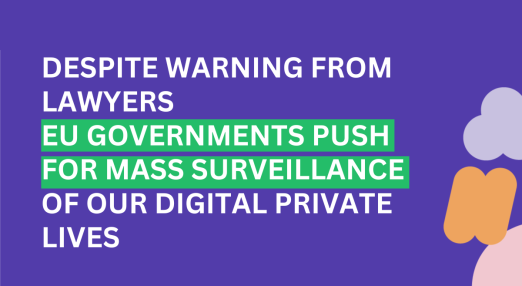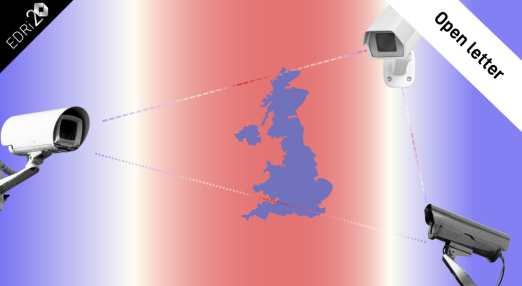Despite warning from lawyers, EU governments push for mass surveillance of our digital private lives
Whilst several EU governments are increasingly alert to why encryption is so important, the Council is split between those that are committed to upholding privacy and digital security in Europe, and those that aren’t. The latest draft Council text does not go anywhere near far enough to make scanning obligations targeted, despite clear warnings from their own lawyers.
Filter resources
-

Despite warning from lawyers, EU governments push for mass surveillance of our digital private lives
Whilst several EU governments are increasingly alert to why encryption is so important, the Council is split between those that are committed to upholding privacy and digital security in Europe, and those that aren’t. The latest draft Council text does not go anywhere near far enough to make scanning obligations targeted, despite clear warnings from their own lawyers.
Read more
-

Press Release: The EU’s Internal Market Committee votes for protecting encryption in the CSA Regulation
The European Union’s Internal Market and Consumer Protection (IMCO) Committee becomes the fourth European Parliament Committee to adopt an opinion on the European Union Child Sexual Abuse (CSA) Regulation, voting to protect encryption and rule out unacceptably risky technologies.
Read more
-

Encryption protects our rights, privacy is not a crime
End-to-end encryption is currently under attack by prosecutors and legislators in France, the EU, the UK and the US. We are asked to choose, as a society: do we accept a future in which our private mail and communication can be intercepted anytime, in which we are treated as potential suspects?
Read more
-

Warnings from the UK: 24/7 racialised GPS surveillance
Campaigners assembled outside Capita PLC’s Annual General Meeting in the City of London on Thursday 11 May are contesting the outsourcing company’s £114m contract to deliver 24/7 GPS monitoring services, used by the Home Office to surveil people without British citizenship.
Read more
-

Civil liberties MEPs warn against undermining or circumventing encryption in CSAR
MEPs from the European Parliament’s Civil Liberties committee have thrown down the gauntlet with their amendments to one of the EU’s most controversial proposals: the Child Sexual Abuse Regulation (CSAR). These amendments show a clear majority for fully protecting the integrity of encryption. Content warning: contains discussions of child sexual abuse and child sexual abuse material
Read more
-

Online Safety Bill insecure: international organisations, academics and cyber experts urge UK government to protect encrypted messaging
EDRi, Open Rights Group and over 80 civil society organisations, academics and cyber experts from 23 countries have written to the UK government to raise the alarm about proposed powers in the Online Safety Bill.
Read more
-

Bits of Freedom monthly update on human rights & tech: April 2023
Read through the most interesting developments at the intersection of human rights and technology from the Netherlands. This is the fourth update in this series.
Read more
-

Open letter: Gender-inclusive and safe digital world that is free from violence for all
EDRi and 45 organisations call on the European Parliament to better protect those who face digitally facilitated gender-based violence.
Read more
-

Government bans TikTok (sort of), Facebook has a bad day in court, and civil society organisations mobilise against Big Tech
Read through the most interesting developments at the intersection of human rights and technology from the Netherlands. This is the third update in this series.
Read more
-

Commissioner Johansson cannot be trusted with the EU’s proposed CSA Regulation
In the midst of a wide range of concerning practices and behaviours, EDRi has found it necessary to raise a formal complaint against the EU’s Home Affairs department for possible breaches of independence.
Read more
-

The CSA Regulation: how did it reach this point?
How did we reach this point of even discussing a law (Child Sexual Abuse Regulation) that so manifestly undermines our democratic structures, threatens to override the fundamental rights that generations have been fighting for, and ignores solid evidence and unanimous professional expertise?
Read more
-

Do you trust the police? CJEU Advocate General accepts access to phones for any type of crime
In its opinion on the Bezirkshauptmannschaft Landeck case, the Advocate General of the European Court of Justice is failing to suggest adequate safeguards for police access to our smartphones.
Read more
